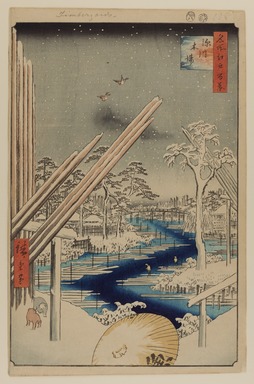
Artist:Utagawa Hiroshige
Medium: Woodblock print
Geograhical Locations:
Dates:8th month of 1856
Dimensions: Sheet: 14 3/16 x 9 1/4 in. (36 x 23.5 cm) Image: 13 3/8 x 8 3/4 in. (34 x 22.2 cm)
Collections:
Exhibitions:
Accession Number: 30.1478.106
Image: 30.1478.106_PS20.jpg,
Catalogue Description: After the fire in 1641 which destroyed both houses and the lumber needed to rebuild them, lumberyards were removed to the Fukagawa district, east of the Sumida River, to the place officially named Fukagawa Kiba ("wood place"). In this scene one sees the leaning poles, two sparrows, two loggers, two puppies, and at the bottom, a yellow umbrella which has the "fish mark" of the publisher Uoei. The lumber was transported to and from the Kiba lashed onto rafts and poled by skilled loggers, two of whom are seen here wearing straw capes. The Fukagawa lumberyards survived until the mid 1970's when the land began to subside, obstructing the passage of the lumber boats. Today, much of Tokyo's lumber arrives by ship from all over the world and is then transported by truck. However, Kiba survives as a place name.